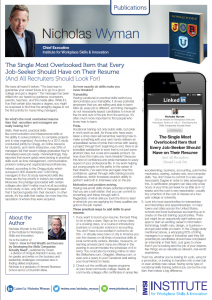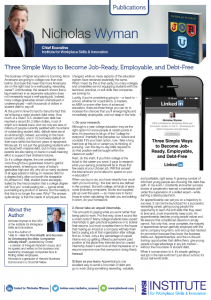The Single Most Obvious Place You Might Not Have Thought to Look


It’s no myth: employers today are struggling to find enough people with the ‘right’ skills for the job. According to a recent Accenture survey, a stunning 46% of U.S. executives anticipate that over the next two years they won’t have the skilled labor they need.[1]
This skills shortage poses a real threat to many businesses – and yours may soon be one of them. Sixty-six percent of the executives surveyed by Accenture face losing business to the competition, and 64% will lose revenue thanks to the lack of skilled employees. More than half risk a serious drop in customer satisfaction, stalled innovation, and delays in development of new products and services.
Are you having a hard time finding people with the skills needed to innovate and grow your business? If so, there may be one obvious place you haven’t thought to look yet: inside your own company. Instead of spending time and money on recruiting new hires, consider making an investment in training the talent you already have.
More and more, smart companies are growing the valuable human capital they need through on-the-job training. Take a look at MGM Resorts International, for example. Through MGM University, the company provides skills training and professional development for over 66,000 employees, with affordable courses in areas ranging from operations and computer skills to leadership development, HR and finance. When you think about it, it is a win-win proposition. MGM can count on always having a pool of trained talent they need to staff their fifteen resorts worldwide. At the same time, they keep their employees happy and motivated by giving them the opportunity to invest in themselves, further their careers, and increase their earning potential.
MGM is just one of an increasing number of companies securing their future through robust in-house skills training. Whatever the size of your business, you can easily follow their example to ensure a productive, satisfied workforce – without having to look any further than your existing talent roster.
Why invest in on-the-job training?
1. It will save you time and money.
You’ll see these savings both in reduced turnover costs and less time spent recruiting. When human resources can pull from within the company to fill existing roles, it not only saves time spent on recruiting, but also money on flying and interviewing potential candidates. Plus, you save time and money on orientation and basic training when you fill new roles with people who already know the business from inside. And, finally, providing opportunities for ambitious employees to advance reduces your chance of losing them.
2. It builds loyalty and motivation.
On-the-job training and apprenticeships build loyalty, and you can’t put a price on that. When employees can see a clear path upwards in the company, it increases their commitment to the business. When people know they’re not in a ‘dead-end’ job, but rather one with opportunity for growth and development, it does wonders for job satisfaction and in turn, productivity and motivation.
3. It encourages a learning culture.
Business thrives in an atmosphere of open communication and knowledge-sharing. This comes at no extra charge when skills training is part of your business model. Even staffers who are not directly involved in training at the present time benefit from a work environment that encourages learning.
4. It ensures the future of your business.
With nearly half of U.S. executives today facing loss of revenue or a freeze in growth due to skills shortages, now is the time to take control of your company’s future. In today’s competitive global economy, developing human capital is the killer app for the future.
So whether you’re a manager, an HR professional, or the owner of your own business, if you’re struggling to find the right talent, the answer may be right in front of your eyes.
Photo: Getty Images
[1]Accenture. (2013). Accenture 2013 skills and employment trends survey: Perspectives on training [PDF].







